Desire Paths is a newsletter about the wild, winding, lesson-filled lives of fascinating people. Thanks for coming on the journey.
Welcome back to Desire Paths.
Also… shit. I guess it’s been a while.
Since the last edition, I’ve dodged soul-destroying rain in LA, travelled back to London for a week of meetings and friends, had a long weekend on Long Island making spiedini for a family party, and spent a glorious, mezcal-fueled, life-changing (really) 10 days in Oaxaca as a student in a street photography workshop with Alex Webb and Rebecca Norris Webb, two photographers I’ve admired for ages.
Back in Santa Monica now and the sun is finally peeking out again.
A quick note on the pace of publishing: I always prefer quality over quantity. I never want to send you guys something just for the sake of keeping up some schedule. But still... a few months’ gap is too long. I’m gonna start posting a lot more. And I’ve got some incredible stories lined up… including today’s, with TRUCK’s Tok Kise.
I hope you enjoy it. And as always, lemme know what you think! daniel.giacopelli@gmail.com.
—DG
I’m Danny – an editor, photographer, traveller and small business fan. My day job is editorial director of Courier magazine. This is my personal newsletter, Desire Paths.
DP is based on the idea that the most fulfilled, fascinating people in the world are those who look at the boring, comfortable, predictable path they could take in life and say nope. Instead they chase after risky, weird dreams, change careers, make unconventional decisions, or cross oceans to start something new (or just start over).
I dig deep with these people and share everything I learn with you. Let’s go.
#3: Tokuhiko Kise
“I feel happiest when I'm making something new, something that people love.”
In the late 1990s, Tokuhiko (Tok) Kise was a broke 20-something living on the outskirts of Osaka, Japan, making furniture that no one seemed to want to buy.
That’s because, as he admits, he was located in the middle of nowhere. Few people walked by his small woodshop, and since this was an age before e-commerce, zero foot traffic meant zero sales.
So Tok and his partner Hiromi Karatsu formulated a plan: they’d move to the city proper, where they’d build a single space to 1) make their furniture, 2) sell their furniture, and 3) where they could live, too.
This sort of multipurpose live/work urban space was more common for bike shops, where the owner might work in the back, sell in the front, and live upstairs. But such a setup was rare back then for the furniture world. At least, no one in Osaka was doing it. So in 1997, they did it.
It was the birth of TRUCK.
In the 26 years since, TRUCK has become a cult-favorite furniture and lifestyle brand in Japan. Customers love the timeless furniture, the quality, the lack of short-lived trends, and also the quirkiness: TRUCK’s made books, music, accessories from leather scraps, and even opened a cafe and donut shop. It’s the sort of brand that once you discover, you want to tell everyone about it.
Which also explains why TRUCK’s become popular further afield. For years, American fans have crossed their fingers that TRUCK would set up stateside. Now, although it’s not quite a store (more on that later), Tok’s scooped up a cavernous apartment-showroom in an industrial area of downtown LA, where US customers can touch, feel and try before they buy.
It’s on a slightly gritty backstreet, right near the 10 and lots of commercial activity: semitrucks unloading stuff, an importing outfit called Ameri-China International, men with hard hats and clipboards wondering where the guy with the camera is going.
The sort of place where you can easily get lost. And, when meeting Tok for our interview, I did.
Once Tok opens up his big black gate (unmarked, in my defense), you stroll past his vintage pickup truck in a courtyard, walk through his front door, and you’re immediately struck by just how cozy and welcoming everything suddenly feels. Piano music fills the space from a record player, there’s a beautiful motorcycle in a corner, there’s a shelf of booze, a guitar, and some TRUCK books.
Tok’s seemingly built a little oasis here – and an entire company in Osaka for a quarter of a century – out of wood, consistency, smiles and good vibes.
I wanted to know how (and why) he did it.
Tok, tell me about your childhood. What were you like as a kid?
I was born and raised in Osaka, Japan. I’ve always liked making things since I was a child. Custom bicycles, too. I remember being 10 years old and going to the mountains near Osaka with my brother. He’s 8 years older than me and rode motorcycles. I’d always sit on the back and we went up to the mountains together. I’d also carry my bike up and down the mountains – this was before mountain bikes were a thing. When I was 13, mountain bikes finally got to Japan and as soon as I got one, I always went to the mountains. I’ve been interested in the outdoors ever since.
Did you get the idea for making furniture when you were out there in the woods?
When I was 17, I discovered a school in Nagano Prefecture – maybe you can call it a shop class – where you learn how to make furniture. I decided to go there after I finished high school. Part of me thought making furniture would be good for me, but the other part just thought that Nagano was such a beautiful city, surrounded by beautiful mountains – the ‘Japan Alps’. I spent a year in Nagano and it was great. But then I came back to Osaka and started working at a small chair company near my parents house. I worked there for three years and eventually opened my own woodshop when I was 23.
Did you have any customers back in those days?
No… no one! I rented a small shed and bought some old machines. But I spent all my money on those machines and so had no money to buy timber. I’d pick up wood scraps from the street, and I started making a coffee table. That was my beginning.
Were there a lot of other independent furniture makers in the city?
No, no. Of course, there were people who made wood furniture independently, but they lived in the countryside, because it cost less. Maybe once or twice a year they'd show their furniture in Tokyo in a gallery. I saw people like that in Nagano. But I wanted to do it in the city. In Japan there are small bike shops where they do their work on the street level, but the owners live on site, too. I wanted to do that with furniture making. So I did it.
But for those first five years I was on the outskirts of Osaka, and there was no one there. I mean… no one was walking past my woodshop. So in 1996, I moved to the actual city, Osaka, and set up a woodshop and in front of that my own furniture store, TRUCK. That was 1997.
Let’s rewind. You built this new workshop and shop, TRUCK, inside an old building you found. How did you transform that space?
I basically wanted to design a place that would have 3 uses: to live, make, and show. And I eventually found a building – the first concrete building in Osaka, I was told – that was more than 50 years old. The owner was in the brass or materials business and had used the 1st floor for the business, and the 2nd floor upstairs as a place for living. It had a very traditional Japanese style, but they hadn't used the space for at least ten years. So I remember it smelled! But I still wanted it. I was like 27 or 28 at the time and I looked like a kid. The owner wondered if I could pay the rent, as it was a lot. When I told them I wanted to renovate everything, the owner turned me down.
So what was plan B?
I told my architect friend, and he made me a blueprint (of sorts) of what I wanted to do. It was sort of like a fake – but it still looked okay! After that, the owner said yes.
Amazing.
For an entire month I worked on that big space, I built a wooden floor, painted the whole place white, and made a unique place to live. It was a pretty uncommon space for Japan. And then I moved my machines downstairs. But, once again, by this point my money was all gone!
Were you self-funding this construction project? Savings?
Yeah, savings. Then one day I went to a store in Amerikamura, in Osaka. I found two chairs that I really wanted, but the price was too high. I got to talking with the owner and he asked me, ‘Do you make furniture?’ I said ‘Yes, I'm about to open a furniture store in front of my workshop’. And he said I should do it immediately, because somebody will probably do the same thing before me!
The same concept, making and selling furniture in the city?
Yes. So that was, you know, my ‘switch on’ moment.
That guy lit a fire under your feet.
Exactly. So a month or two later, Hiromi and I opened our store and named it TRUCK.
Okay, got it. What does ‘TRUCK’ mean? I mean, I know what it means…
Actually... there's no meaning! It's just easy to remember.
But it's in English, too...
Yeah, I just thought it was cool. And memorable, right? I always found myself not very good at remembering other store names. And TRUCK was so easy. Everyone knows the word.
It's a good name. One syllable.
But still, people would always ask me: Why TRUCK? And so I started making up other reasons using the word TRUCK. I like pickup trucks, like the one out front here. Old pickup trucks that maybe a farmer might use, like a Ford, Chevrolet, Dodge. They're old and muddy, but they're tough and work hard. And that's sort of what I'm doing. I make furniture, I work hard, there's always a lot of dust in the woodshop, and I want people to use my furniture for many years.
TRUCK’s got a cult following now. When did it start to gain momentum?
I remember well that for the first month we had no sales. It's true. The space was still very small and we had limited pieces, like only 8 or 10 pieces. But at least people still came everyday, so it was fun for me. I was making furniture behind the sliding door and lived upstairs. But, again, I didn't have any money left! So we started to rent the space for photo shoots, which helped me to buy timber. People even came from Tokyo for magazine shoots. Maybe you know Popeye...
I love Popeye.
They featured us back then. Around that time, I decided to make a catalog. The internet wasn't like it is now. We didn't have a website. But I wanted something to tell the story of what we were doing. So we made a catalog, but it was more than a catalog. It was a book. We printed 2,000 copies of it and I visited bookstores in Tokyo. But I didn't know anything about books or retail or distribution.
So it was a proper catalog meant to sell TRUCK’s products?
Yeah it was a real catalog with prices, except we sold it for ¥1,800, like twenty bucks. Five or six bookstores said, ‘OK, we like it’. Before then, I thought I might have to live with or sleep on top of 2,000 copies forever!
2,000 is a lot…
But within a few months, they were all gone. Soon enough, Kinokuniya, a big bookstore, called me and said they wanted to sell the catalog too.
It's kind of funny that people were essentially buying your direct marketing.
Yeah, companies usually make a catalog and just [throw it around] for free. But I thought... It's a good book! I didn't want to give it out for free.
Do you still have copies of it?
Yes, some, just for the archives. For like 20 years after that, I'd meet photographers, stylists and designers who would all have that first book, and companies would want to shoot books like us. It was all very funny, because we didn't know anything about commercial stuff at all. I just did what I wanted to.
So you opened TRUCK in 1997. But then more recently you moved to a new location…
Yeah, we moved 13 years after we opened TRUCK, in 2009. Man, I did so many things for that new location. I built four buildings at the same time!
What?!
Yeah, and planted trees and everything. It was actually only three days before opening day when we finally announced it on our website.
But why did you move locations?
That first place was nice, but I was renting a number of buildings and was paying a lot per month. Also: there weren't any trees and I wanted to live with big trees. I needed big trees! So I started to search for a new place, and it took five or six years. Throughout the searching, I was always thinking of Montepulciano in Tuscany. I once stayed there with a very nice couple who were running an agritourism stay. The views were amazing, but they could also walk to a supermarket or hospital. That's fantastic, right? I don't want to drive for an hour to get to a 7-11.
As someone who just moved from London to LA, I feel your pain.
Ha, yeah. So… we didn’t have Montepulciano in Osaka. But I found a space that was surrounded by three schools. It was an old taxi company and they wanted to sell their land. There were buildings but no trees. But I thought that if I could demolish the buildings, build new ones and plant some trees, then it would be really nice. So I decided to buy the land.
I saw an image on TRUCK's website showing you lowering a tree into the ground from a crane.
The story is… everyday I took my five dogs to a big park near my house. It was a big park with big trees and next to the park were apartments. The city decided to demolish those old apartments and cut down those trees. So I talked with Osaka city and told them I wanted to rescue the trees. And they said yes. I rescued more than 30 trees. We kept them in the mountains until we could replant them at our new site.
That would never happen in the US. The city would just be like ‘nah…’
Oh really? Well, trees are alive. I've rescued many cats and many dogs, and trees are the same, they're living.
And you've also opened a cafe & donut shop. Was that a dream of yours?
No, no, no.... I originally wanted a place for TRUCK customers to relax. So the first idea was a corner in the furniture store where you can sit and pour yourself coffee. But I realized I’m not happy if my coffee sits there for an hour or two. It gets cold. So I wanted to offer better coffee. And then donuts came from a memory of mine from Noosa, Australia. I went there for the first time in 2003 and saw a donut machine at a supermarket. It was very cute. Me and my friend really liked that machine and it stayed in my head for like six years. So I thought, maybe we can make donuts and coffee. That would be great. So that's why I opened Bird.
So you started off by wanting to offer some casual coffee and donuts for customers. But now you've got a whole separate brand!
It’s pretty funny, these days most Bird customers don't even know about TRUCK! I'm always like ‘What?! It's right next door!’
TRUCK also doesn't do wholesale. Why not?
I just don't want to think about sales. If I do wholesale, the other company might ask me to make something new or make something other people really like.
You'd have external pressures. You want more control.
Yeah, I want to control everything. How it looks like in the store, for instance. Or what's next to my pieces. Really, I just want to make what I want to make. It's very simple. That's all.
What's motivated you over the years? Do you have a 5 or 10-year plan?
No, nothing.
You’re just making it up day by day?
My father always said to me to make a five year plan, ever since I was a kid. Maybe he did it like that. But I live day by day. Well, maybe just for tomorrow!
Just 24 hours in advance...
I'm really not good at making big plans. It’s more like ‘Today I want to go to this place.’
Were you just as spontaneous when you decided to get a place in LA?
My friends Stephen and Beks live here and have their own furniture brand. They visited TRUCK almost ten years ago. I saw them climbing up the stairs to the store and I went to say hi. We started talking and he said he also makes sofas. Since then we've been friends. Do you know Deus ex Machina?
Yeah, definitely. They've got a store here in Venice.
I knew people from Deus and Stephen also knew them, so Deus asked us to do a collaboration for their new Tokyo store. We did that and we also shot a short film with Deus here in LA, riding motorcycles and visiting an upholster. I'd visited downtown LA and liked these buildings. And one day Stephen said there's an empty space in the building… so I decided immediately to rent it. But another guy took it, so I waited a year. And then it happened again!
Basically I've waited two years for this space. The idea, though, wasn’t to make a business space. It was more for personal reasons. I’d never lived abroad and I just wanted a place to stay when I’m here, to feel like I’m living in LA. But then I started shipping my furniture over here... and now it's like our showroom!
It was inevitable.
We’ve always been shipping our furniture to California, New York, Europe. But now we can show it here in person, so you can touch it. It's good.
Would younger you be surprised where you've taken TRUCK?
I always say that I'm lucky because I'm just doing what I want to do and making what I want to make. It's that simple. But it's been 26 years since I started TRUCK – and back then I had nothing. No money to buy timber! Now we’ve got like 20 people working for us, and I have their family on my shoulders, too. It’s our responsibility to make good products and I'm serious about the small details. But still… I’m just a furniture maker, I’m not a businessman. I want to keep the company small and I try not to think about money or expanding. I don't want to open a store in New York or Milan. No, just Osaka. And LA – but remember, this is just my apartment!
Sure. And what makes you most happy, Tok?
I feel happiest when I'm making something new, something that people love. A new prototype, for instance. First I'll say, ‘okay, it's good’. The next step is getting the approval of the people working with me. And maybe then I'll put it in the store. Then if a customer is interested in it, it's just so satisfying. But if they buy it?! Oh, man. ‘You want to buy this?’ That's unbelievable! It’s not about money. It’s just the best feeling.
BIG LESSON: To build something long-lasting, you don’t need to plan ten, or even five, years into the future. You just need to wake up everyday and do what you love doing with consistency. That consistency will pay off down the line.
Go deeper… Tok // TRUCK // Bird // Films // History
Thanks so much for reading. Desire Paths is a newsletter about the wild, winding, lesson-filled lives of fascinating people. If you enjoyed it, I’d love if you’d consider subscribing or sharing with a friend.






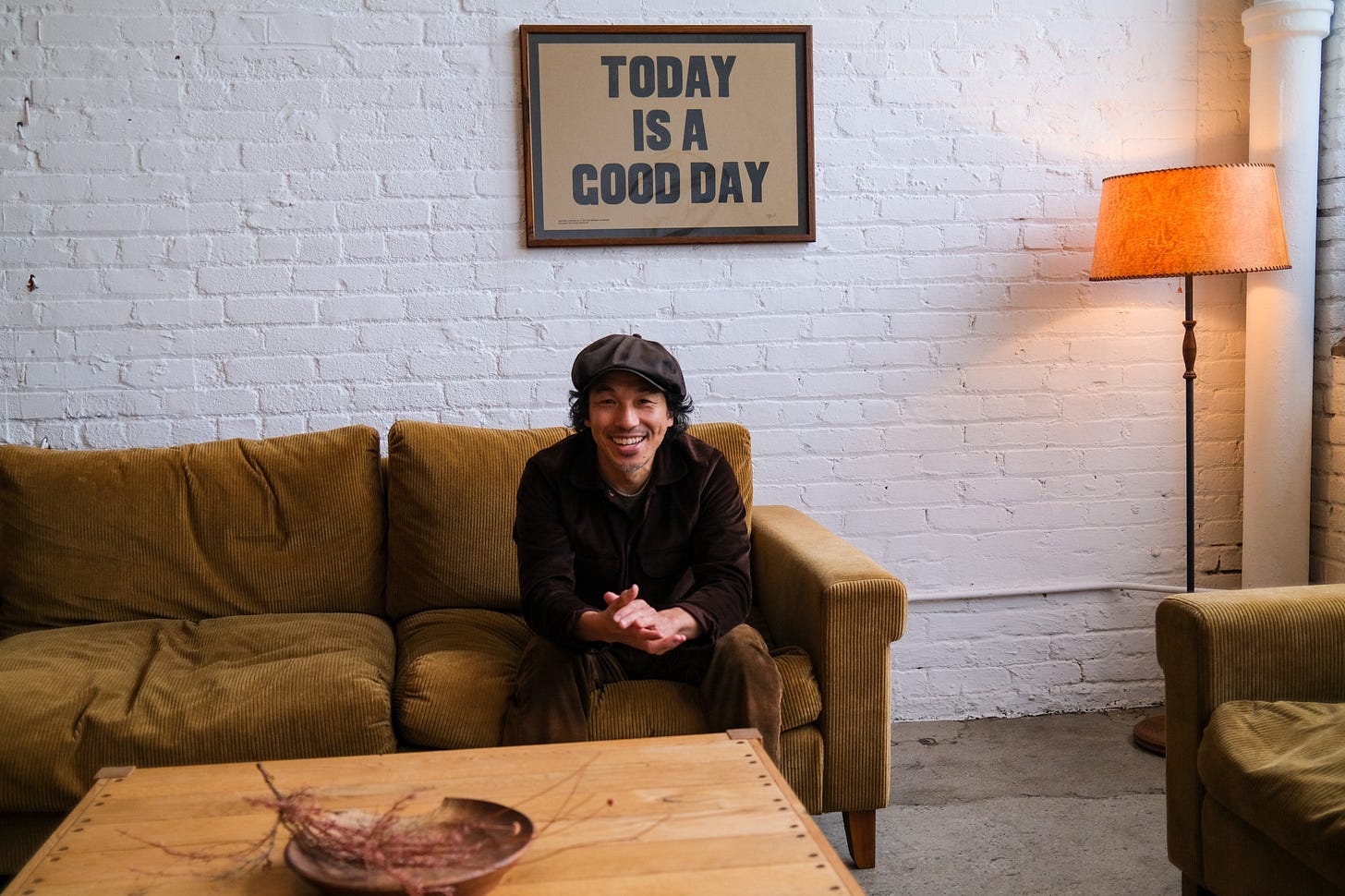



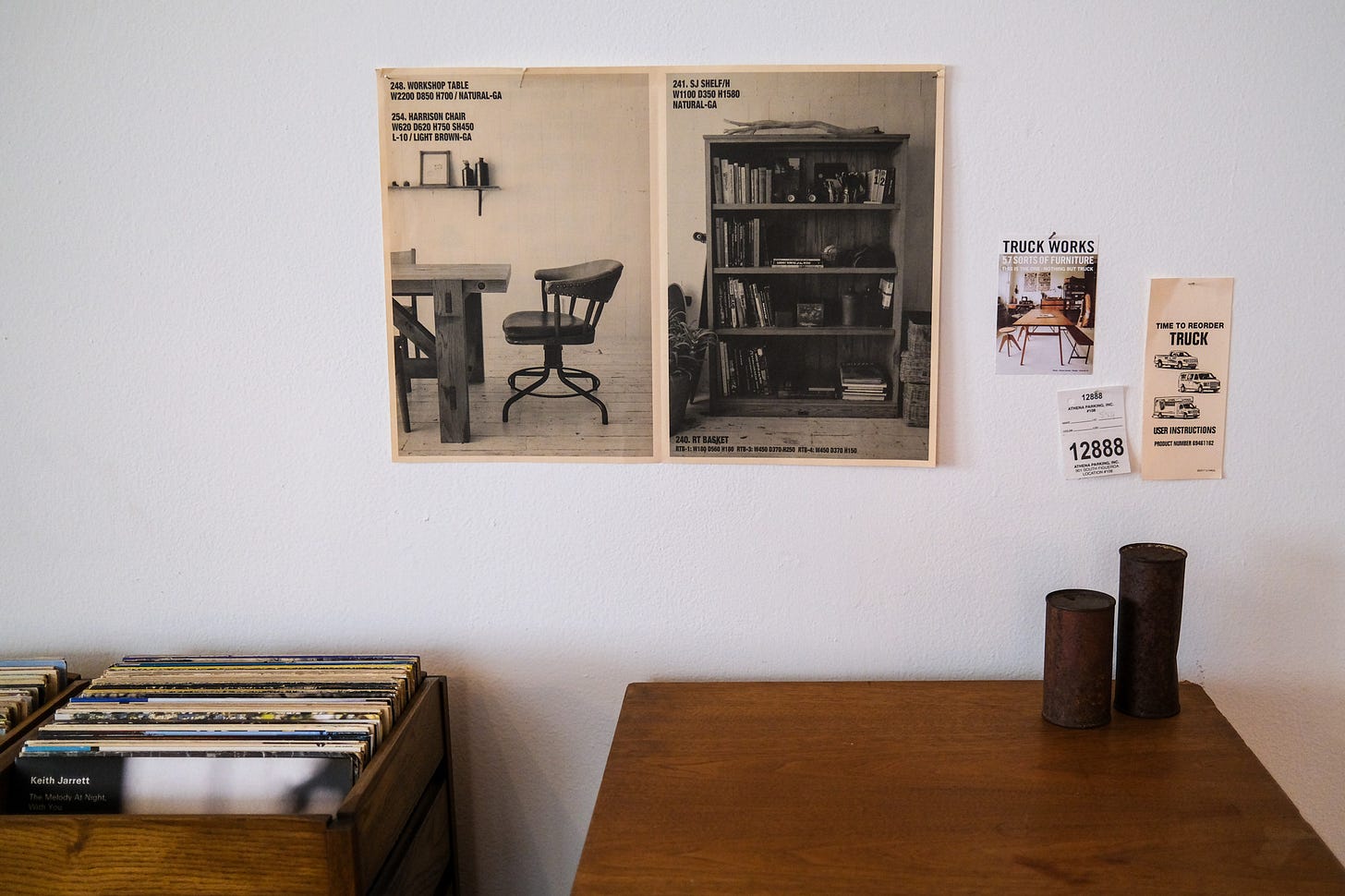

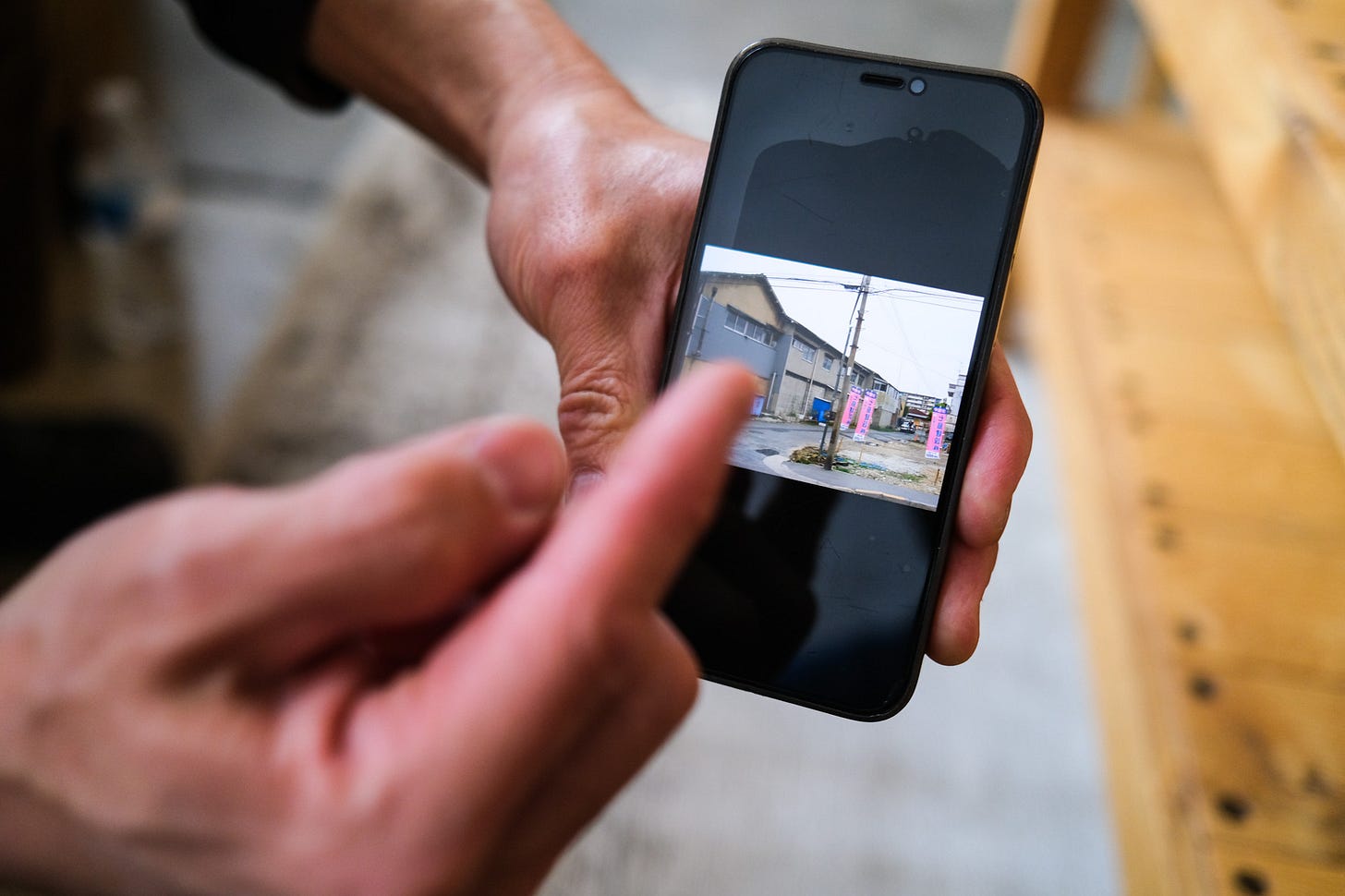
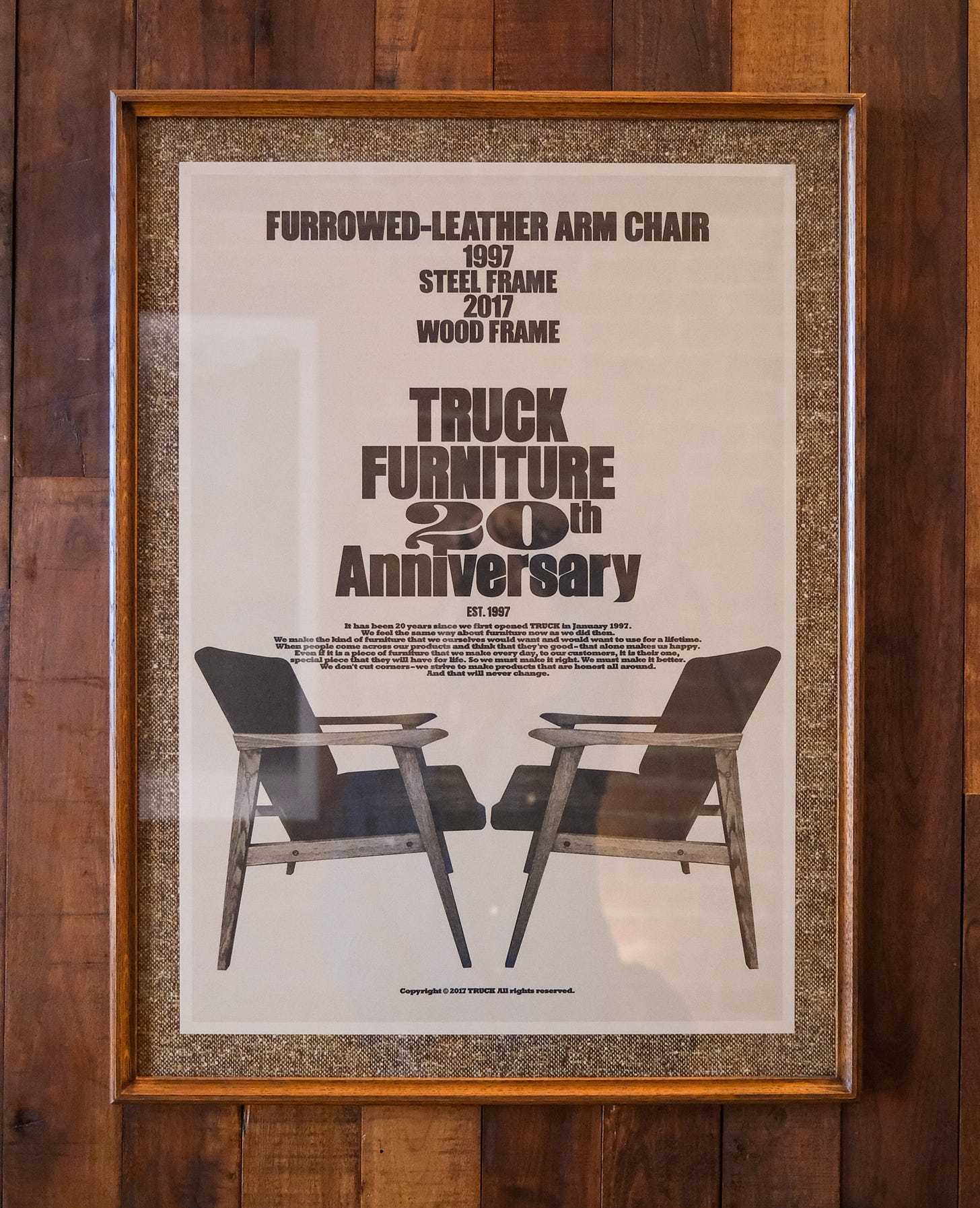

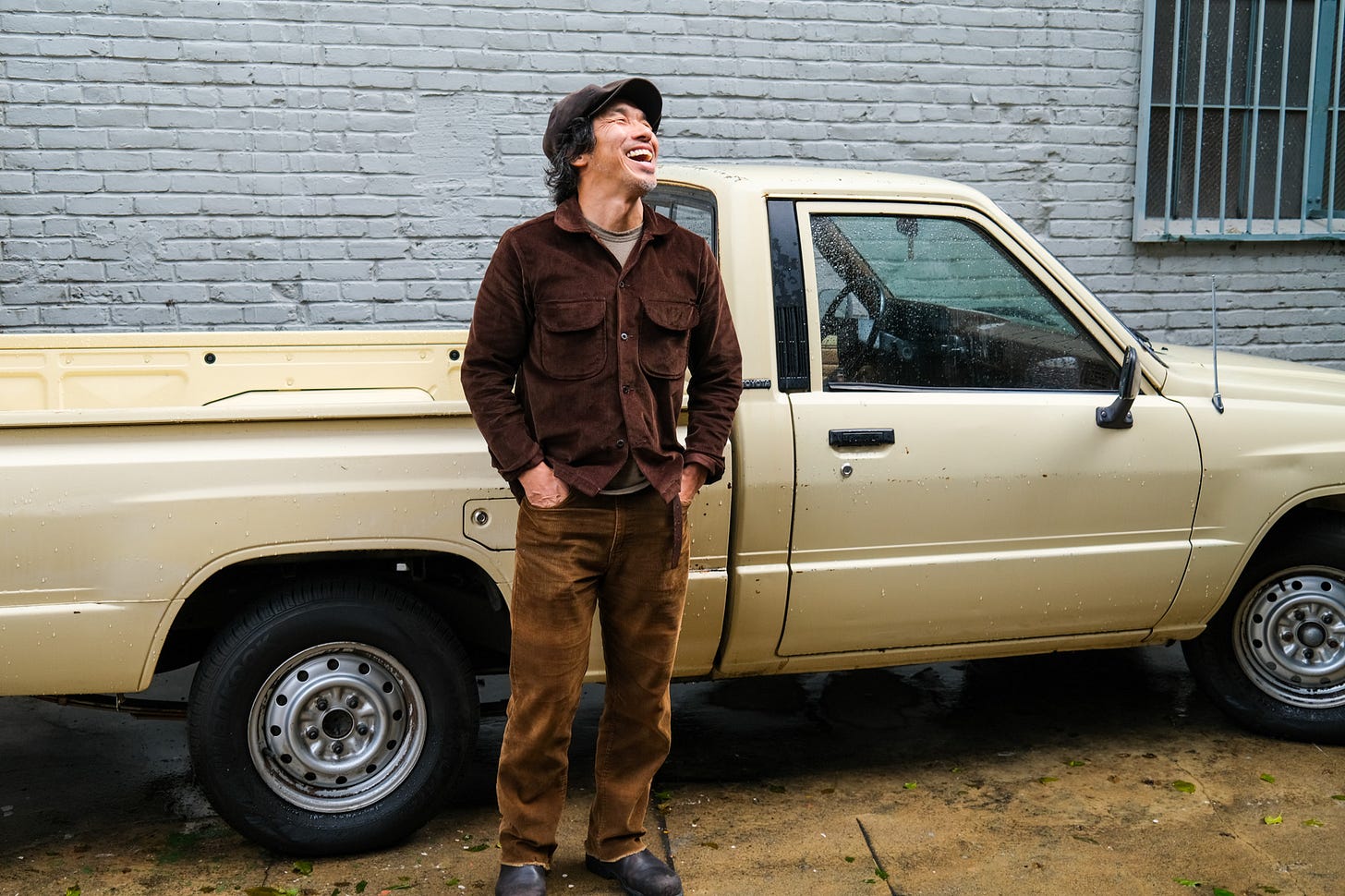
definitely made me want to come and pay him a visit. thanks for sharing such a story.
Donuts, coffee and craft - I want to be Tok’s friend. Thanks for this in depth write-up. Although I’m in NYC, i felt close to LA and Japan.